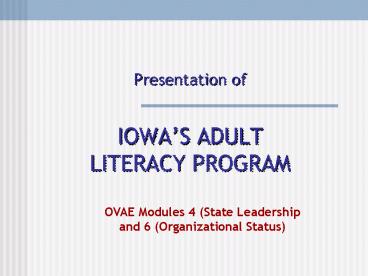Presentation of IOWAS ADULT LITERACY PROGRAM PowerPoint PPT Presentation
1 / 18
Title: Presentation of IOWAS ADULT LITERACY PROGRAM
1
Presentation of IOWAS ADULT LITERACY PROGRAM
OVAE Modules 4 (State Leadership and 6
(Organizational Status)
2
Presentation Objectives
- Orientation to Iowas Community College
Consortium Based Adult Literacy Program
- Orientation to Iowas Adult Literacy Program
Staff Development/ Research Initiatives
3
IOWAS ADULT LITERACY PROGRAM ORIENTATION
4
Iowas Adult Literacy Program Vision Statement
for Program Year 2005
The following vision statement constitutes Iowas
long-range vision of the statewide adult literacy
program through state Program Year 2005 (July 1,
2004-June 30, 2005). The purpose, goals,
objectives and activities of Iowas statewide
adult literacy program are designed to achieve
the fulfillment of the vision. The vision
statement is consistent with the purpose and
intent of the Adult Education and Family Literacy
Act.
5
Iowas Adult Literacy Program (cont.) Vision
Statement for Program Year 2005
- the literacy rates for Iowas adult populations
will be benchmarked through the National Adult
Literacy Survey (NALS) and the Iowa State Adult
Literacy Survey (IASALS)
- the concept of distance learning will be an
accepted instructional strategy for adult and
continuing education through the use of
technology and fiber optics communication (Iowa
Communication Network ICN)
6
Iowas Adult Literacy Program (cont.) Vision
Statement for Program Year 2005
- all basic skills instruction, curriculum,
assessment strategies and methodologies will be
competency-based and evidence-based
- learning gains will be measured in terms of
student outcomes and specific quantifiable
competencies
7
Iowas Adult Literacy Program (cont.) Vision
Statement for Program Year 2005
- basic literacy skill certificates will be awarded
to adult learners for attainment of predetermined
levels of performance in selected subject areas
(i.e. reading, mathematics, writing and
listening)
- a total articulation system, utilizing a common
data base, has been developed and utilized across
all agencies and other entities involving
students learning needs and goals
8
Iowas Adult Literacy Program (cont.) Vision
Statement for Program Year 2005
- the existing community college consortium based
delivery system for adult literacy programs will
continue to serve the literacy needs of Iowas
adult target populations
- the adult literacy program will demonstrate total
accountability in all aspects of program
operations
- the GED pass rate for Iowas GED candidates will
be 92-96
9
Iowas Adult Literacy Program (cont.) Vision
Statement for Program Year 2005
- all instructional strategies, curriculum, and
methodologies will be aligned to content
standards
- development of a community college based family
literacy model
- the adult literacy program will achieve 90-100
of negotiated benchmark levels for the local
program providers and the Iowa Department of
Education.
10
Iowas Community Colleges
11
(No Transcript)
12
The CASAS System Formula for Success
13
Iowas Adult Literacy Program Planning Process
Framework
Use Practices, Processes
Analyze Data on Populations, Partners,
Instruction
Evaluate Program Outcomes
Develop Implementation Plan and Process
Document Plan Effectiveness
Identify Strategies, Processes, Practices
Source AIDDE Framework Abt Associates, Inc.
14
Iowas Adult Basic Education Indicators of
Program Quality for Title II of the Workforce
Investment Act (WIA) of 1998
TOPSpro Data Dictionary
Database Match
Customer Results/Satisfaction Program
Accountability
TOPSpro MIS
National Reporting System (NRS)
Instructional Planning
Assessment
Services to Learners Program Instructional System
Community/Agency Collaboration Support,
including Memorandums of Understanding (MOU)
Professional/Staff Development
Curriculum Frameworks
Community College Delivery System
Leadership and Continuous Improvement
SOURCE Adapted from Oregon's Indictors of
Program Quality (March 2000).
15
Adult Education and Family Literacy Act Iowa
Implementation Scheme
ADULT LEARNER
SOURCE Iowa Department of Education and Iowas
community college based adult literacy program.
16
STEP 2 COLLECT DATA
STEP 7 MEASURE BENCHMARK IMPROVEMENT
IOWAS NRS BENCHMARK CONTINUOUS IMPROVEMENT MODEL
STEP 6 IMPLEMENT ACTION PLAN
STEP 3 ANALYZE THE DATA
STEP 5 IDENTIFY SOLUTIONS
17
Flowchart Depicting Adult Learner Progress
Through an Adult Literacy Program to Achieve
Learner Goal/Program Outcome
Instructor designs curriculum for class using
research based instructional materials linked to
competencies in the learners individualized
education plans.
S T A R T
Identify achievable learner goals for program
year related to the following 1)
Employ-ability/Postsecondary Education or
Training 2) Credential Attainment
ADULT LEARNER ENROLLS IN ADULT LITERACY PROGRAM
Develop an Individualized Plan (IEP) based on
learner goal(s) and assessment results. Identify
competencies for instruction based on subject
areas.
Appropriate appraisal is given to determine
instructional level of learner.
Administer appropriate Post-Assessment(s) for
Reading, Mathematics, Writing or Listening
Administer one or more of the following
PreAssess-ment(s) Reading, Mathematics, Writing
or Listening. Determine assessment level and
content area based on learner goals and appraised
results.
Is there a learning gain? (movement within or
completion of an Educational Functioning Level)
NO
Learner needs additional instructional
intervention in order to meet goals and attain
desired measurable outcome. Reassess education
plan based on Post-Assessment results.
Learner attained one of the following NRS/State
measurable outcomes related to stated goal
- Employment/Postsecondary Training
- Entered Employment
- Retained Employment
- Entered Postsecondary Education or Training
YES
Does measurable outcome meet learners goals upon
entry into program?
- Credential Attainment
- Earned Basic Literacy Certificate
- CASAS Levels A, B, C or D in content areas of
Reading, Mathematics or Writing - Earned GED Diploma
- Earned Adult High School Diploma
Does learning gain result in measurable outcome
related to 1) Employment Post-secondary
Education or Training or 2)
Credential Attainment?
SOURCE Iowa Department of Education and Iowas
community college based adult literacy program
18
Iowa State Staff Development
ABE Teacher Model
- Writing Skills
Workplace Literacy
EL/Civics
Power
Family Literacy
- GED
Content Standards
- NRS
May 2004

